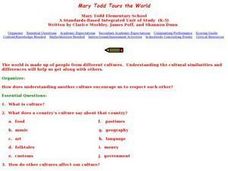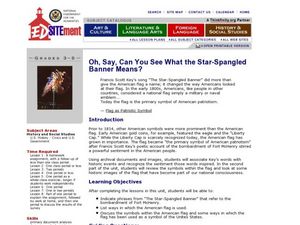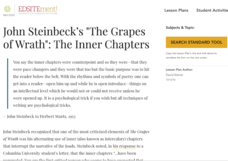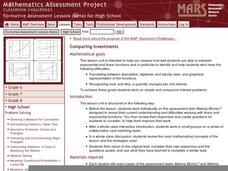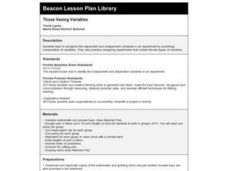Curated OER
Mary Todd Tours the World
Pupils analyze how distinguishing another culture encourages us to respect each other. They research culture and all its avenues, recognizing and comprehending the relationship between people and geography. Ultimately, they can apply...
Curated OER
Oh, Say, Can You See What the Star-Spangled Banner Means?
Students research the historical inspiration for the lyrics of the "The Star Spangled Banner". They explore websites, read articles and analyze poetry in an examination of America's patriotic symbols and history.
Curated OER
Tiling Tessellations
Students explore tessellations. In this shapes and geometry instructional activity, students describe the attributes of many of the shapes displayed on an Elmo. Students create examples of tessellations using pattern blocks.
National Endowment for the Humanities
John Steinbeck’s "The Grapes of Wrath": The Inner Chapters
Here’s a must-have resource for anyone using The Grapes of Wrath. Everything from guiding questions to background information, from photographs to documentary films, from activities to assessments is included in a richly detailed packet...
Curated OER
The Business of Interest
Learners learn about finance and money management and use math to solve problems, communicate, and explore real life situations as they deal with banks. In this financial management lesson, students apply their math skills to real life...
EngageNY
Why Do Banks Pay YOU to Provide Their Services?
How does a bank make money? That is the question at the based of a lesson plan that explores the methods banks use to calculate interest. Groups compare the linear simple interest pattern with the exponential compound interest pattern.
Curated OER
Change Mixer
Students use their abilities to recognize coins and their values in this game that focuses on locomotor skills (skip, slide, gallop, run, jump). This game also requires students to add coin values.
Curated OER
The Penny-- 1 Cent
In this math and reading worksheet, students learn to recognize the penny and read some factual information about it. Students study photographs of the front and back of a penny, and practice printing "penny" on the primary lines.
Curated OER
Valentine Shop
Students use Coin Critters software to practice coin recognition. Students complete a printing project for the cover of Valentine cards and use monthly calendars or a hundreds chart to count by 5's and 10's. Students use KidPix to create...
Curated OER
ANDERSONVILLE PRISON: AN ECONOMIC MICROCOSM
Students identify the conditions faced by the prisoners of war at Andersonville during the Civil War. They examine how a group of civil war prisoners developed an economic system within their camp.
Curated OER
Finding Verbs
In this grammar learning exercise, students review how to recognize verbs in sentences and then find and circle the verbs in twenty sentences.
Curated OER
Parts of a Whole
Students recognize coins are worth a fraction of a dollar. They represent the value of different coins by shading in their equivalent fractional parts in the circle. They understand that fractions are part of a whole.
Curated OER
Presidential Faces Worthy of Recognition
Using dollars and cents to study the biographies and achievements of America's past presidents.
Curated OER
Comparing Investments
Money, money, money. A complete lesson that makes use of different representations of simple and compound interest, including written scenarios, tables, graphs, and equations to highlight similarities and differences between linear and...
Curated OER
Buying on Credit
Explore using credit in this financial responsibility and math lesson. Learn to identify the acronym of "PRT" as Principle x Rate x Time, then calculate interest based on this formula. Do some real-world problem solving and choose...
Curated OER
Identifying Theme
What's theme, and can texts of every length have one? Explore the themes of fives short reading passages with your middle school class. Encourage them to highlight specific places in the text where they recognized the theme.
Bright Hub Education
"Where the Red Fern Grows": A Lesson on Love and Devotion
Where the Read Fern Grows by Wilson Rawls is rich with themes relating to love and family. Help your class to understand these themes with the series of reading activities included in this unit outline. Readers can keep a journal to...
Balanced Assessment
Stock Market
Analyze trends in the stock market using histograms. Future economists use data presented in a histogram to find periods of greatest increase and decrease. They also draw conclusions about days that would be best to invest.
Southern Illinois University
I Can Write a Poem
It is so important for English language learners to be able to write for a variety of purposes. Specifically written for an ELD class, this activity provides explicit instruction for teaching learners how to write a poem. First, they...
Sargent Art
Metal Embossing Weathervanes
Metal work has been used for hundreds of years. Ninth graders get a chance to experience the artistry of metal embossing in this highly structured lesson. Each step is accented with a helpful image and related instruction. The end...
Curated OER
Those Vexing Variables
Students recognize dependent and independent variables in an experiment by practicing manipulation of variables; students practice designing experiments that contain the two types of variables.
Curated OER
Inquiry into Consumer Products
Students recognize different consumer products, found in and around the home, that have reactive or denaturing properties when used together. They explore chemical and physical properties of each product by identifying chemical formulas...
Curated OER
Midnight Dumpers
Students explain how pollution affects ground water. They participate in a simulation to discover the location of an illegal dump. Students explore the monetary benefits, risk and environmental concerns are factors in business decisions.
Pennsylvania Department of Education
What is the Chance?
Fourth and fifth graders make predictions using data. In this analyzing data lesson, pupils use experimental data, frequency tables, and line plots to look for patterns in the data in order to determine chance. You will need to make a...


